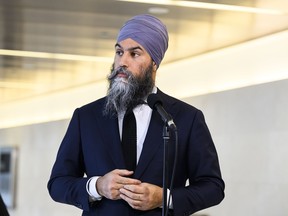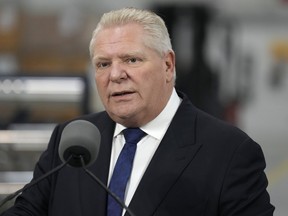Singh said he still intends to vote non-confidence in the minority Liberals when Parliament resumes in March
Article content
OTTAWA — As U.S. President Donald Trump said on Thursday he intends to move ahead with tariffs, with the possible exception of oil, NDP Leader Jagmeet Singh called on the Liberals to recall Parliament and work with opposition leaders on a potential support package for workers who could be hit by the impending trade levies.
Article content
Article content
Singh, who spoke at an event earlier in the day with union leaders in Sault Ste. Marie, Ont., said he wanted to be “really clear” that his intention to vote non-confidence in the minority Liberals when Parliament resumes at the end of March remains the same. The Conservatives and Bloc Quebecois have also pledged to vote down the government, which points to the likelihood of a spring election.
Advertisement 2
Article content
The NDP leader says March 24, the date Parliament is set to resume, is two months away. In the meantime, Singh says that if there are ways to fight back against Trump’s threat of tariffs and deliver support to affected Canadians, “let’s do it.”
“We need to let these workers know, ‘we got your back,’ and so I’m calling on Parliament to be recalled so that we can put in place those protections,” Singh said Thursday. “If there’s any legislation required to actually put in place supports for workers, let’s get that done.”
Gov. Gen. Mary Simon granted Prime Minister Justin Trudeau’s request to suspend Parliament until March 24, which he did to give the Liberal party room to hold a leadership contest to replace him, after announcing on Jan. 6 he would step down as both party leader and prime minister. The Liberals will name their new leader on March 9.
Singh on Thursday pointed out that Opposition Conservative Leader Pierre Poilievre has also called on Parliament to be recalled, adding: “Let’s call it back and get something done to support these workers.”
Speaking to reporters from the Oval Office Thursday afternoon, Trump said he plans to make good on his threat of imposing 25 per cent tariffs on imports from Mexico and Canada as he said he would do on Feb. 1, adding that they “may or may not rise with time.” The president added he would make a decision as to whether to include Canadian oil imports that evening.
Article content
Advertisement 3
Article content
Trump’s comments heaped new pressure on Trudeau’s government to respond. Doug Ford, who is campaigning for re-election as Ontario’s premier, posted on X, that Canada needs to be ready to implement “a strong and forceful response,” with “dollar for dollar” tariffs. Sam Blackett, a spokesman for Alberta Premier Danielle Smith, said in a statement they were “monitoring the situation,” and repeated her calls for Canada to increase its border security, which Trump has named as his main irritant, including by appointing a “border czar.”
Earlier in the day, Employment Minister Steven MacKinnon, who was recently named government house leader, said Ottawa will be ready to hit back in a way Americans would feel should Canada be slapped with tariffs.
“One thing that you can be very sure about is that Government of Canada is prepared, the Government of Canada will retaliate, the Government of Canada will protect workers throughout this process,” he said at an unrelated news conference in Gatineau, Que.
Recommended from Editorial
Advertisement 4
Article content
Trudeau named MacKinnon as government house leader after Karina Gould left the role to campaign for the Liberal leadership. As of late Thursday, the government showed no signs of having a plan to return to parliamentary business.
At a campaign stop in Ottawa, Gould said she would “absolutely” support recalling Parliament to deal with the threat of tariffs if the need emerges. “We have to make decisions based on the needs of the country at the time.”
A spokeswoman for former finance minister and deputy prime minister Chrystia Freeland, another contender in the race, said that “as a sitting member of Parliament,” the Toronto MP is “ready to work with Parliament and all political parties to fight Donald Trump and to fight for Canada.” A spokesperson for Mark Carney, who does not have a seat, did not directly answer, but instead pointed to an earlier statement he made about tariffs.
Energy and Natural Resources Minister Jonathan Wilkinson, who is a member of Trudeau’s cabinet team assigned to Canada-U.S. relations, confirmed the government was looking at how it might be able to support people hit by Trump’s potential tariffs through existing programs and resources. If it needs legislation to deliver any additional support and the opposition parties are willing to work with them, the Liberals would consider recalling Parliament, the minister said on Wednesday, adding he believed those conversations were still premature.
Advertisement 5
Article content
The federal Conservatives have not said whether they would support the government in passing any new legislation designed to deliver tariff-related financial support, as the party did when the COVID-19 pandemic struck in March 2020. That legislation saw the Liberals send tens of billions over two years to businesses shuttered by lockdowns and individuals who had lost their jobs.
Both Singh and Poilievre have said the Liberals must be ready to retaliate in the face of U.S. tariffs.
Foreign Affairs Minister Mélanie Joly, who is in Washington meeting with both Republican and Democratic lawmakers, along with Trump officials, said she conveyed during a meeting with Secretary of State Marco Rubio on Wednesday that Canada would retaliate and “everything was on the table.” During their meeting, she gave him a copy of the book, ‘The Good Allies,’ about the Canada-U.S relationship during the Second World War. In it, she wrote a note that read: “Marco, an example of what we can achieve when we work together.”
On Thursday, she was set to be joined by Public Safety Minister David McGuinty who is trying to sell Trump officials on Canada’s new plan to beef up border security, including by targeting the flow of the deadly drug fentanyl. Immigration Minister Marc Miller was also travelling to join him. On Friday, the trio of ministers were set to meet with Trump’s border czar, Tom Homan.
Advertisement 6
Article content
To showcase its efforts, Finance Minister Dominic LeBlanc also texted a three-minute video of the Canada-U.S. boundary to Howard Lutnick, Trump’s pick to lead the U.S. Commerce Department.
It came after Lutnick said during his confirmation hearing on Wednesday that the Feb. 1 threat of tariffs is directly tied to concerns about fentanyl and immigration, saying the countries could avoid them if the U.S sees them taking action.
“As far as I know, they are acting swiftly, and if they execute it, there will be no tariff. And if they don’t, then there will be,” Lutnick said.
MacKinnon said on Thursday that Canada was doing everything it could to avoid tariffs and that ministers were meeting with every official possible.
Knowing how much of Trump’s concern lies with its northern border is also “part of the problem,” he said.
“Understanding what the motivation for tariffs might be is something that the government is trying to better understand.”
With files from Bloomberg
National Post
staylor@postmedia.com
Get more deep-dive National Post political coverage and analysis in your inbox with the Political Hack newsletter, where Ottawa bureau chief Stuart Thomson and political analyst Tasha Kheiriddin get at what’s really going on behind the scenes on Parliament Hill every Wednesday and Friday, exclusively for subscribers. Sign up here.
Our website is the place for the latest breaking news, exclusive scoops, longreads and provocative commentary. Please bookmark nationalpost.com and sign up for our politics newsletter, First Reading, here.
Article content








